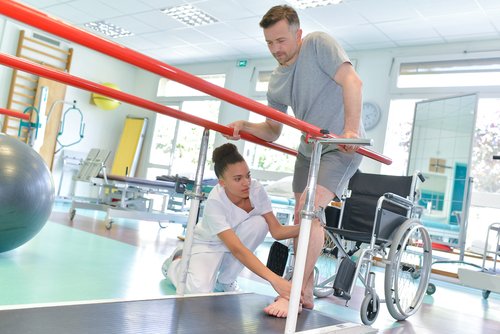Restore Exosuit Could Help MS Patients Improve Their Walking Ability, Study Reports
Written by |

An exoskeleton developed by Harvard University researchers could restore multiple sclerosis patients’ balance and some of their walking capability, according to a study.
ReWalk Robotics is moving toward commercializing the system, developed at Harvard’s Wyss Institute for Biologically Inspired Engineering. In addition to MS patients, the exosuit should help people with Parkinson’s and other neurodegenerative conditions, researchers said.
In contrast with commonly used passive devices, such as canes and braces, which only provide balance assistance, the Restore system plays an active role by helping muscles move.
The exoskeleton uses mechanics and software to deliver supportive force to key joints. The system’s components are connected to a wearable fabric that can be attached to the legs and feet. That’s why its developers refer to it as a “soft suit.”
Wyss Institute and Boston University researchers studied the system’s use in patients with lower limb disabilities who were recovering from a stroke. The research, “A soft robotic exosuit improves walking in patients after stroke,” was published in Science Translational Medicine.
The study covered nine stroke patients who wore the Restore system during walking and treadmill exercises. The exoskeleton reduced the energy necessary for patients to walk by 10 percent, researchers reported.
The relatively low assistance that the exosuit provided was enough to facilitate more normal walking in the patients.
“This foundational study shows that soft wearable robots can have significant positive impact on gait functions in patients post-stroke,” Conor Walsh, a Wyss Institute professor and Founder of the Harvard Biodesign Lab, said in a press release. The research was the result of a “multidisciplinary team of engineers, designers, biomechanists, physical therapists and most importantly patients who volunteered for this study and gave valuable feedback that guided our research,” Walsh said.
The Wyss Institute and ReWalk are now working together on lightweight designs for the suit. The intent is to use them in clinical trials aimed at obtaining regulatory approvals, so the device can be marketed worldwide.
The first application will be for stroke patients, followed by multiple sclerosis patients and those with other conditions.
“Exoskeletons are now a commercially available, disruptive technology that have changed the lives of many individuals in the paraplegic community,” said Larry Jasinski, ReWalk’s CEO. “The ongoing research at the Wyss Institute on soft exosuits adds a new dimension to exoskeletons that can potentially meet the needs of individuals that have had a stroke, as well as for those diagnosed with multiple sclerosis, Parkinson’s disease or people who have limitations in walking.
“The Restore is a unique lightweight design that can assist and constantly adjust in real time to the user’s needs on every step they take,” he said. “The depth of this fundamental science is a meaningful element in applying research to the everyday needs of this patient community.”


